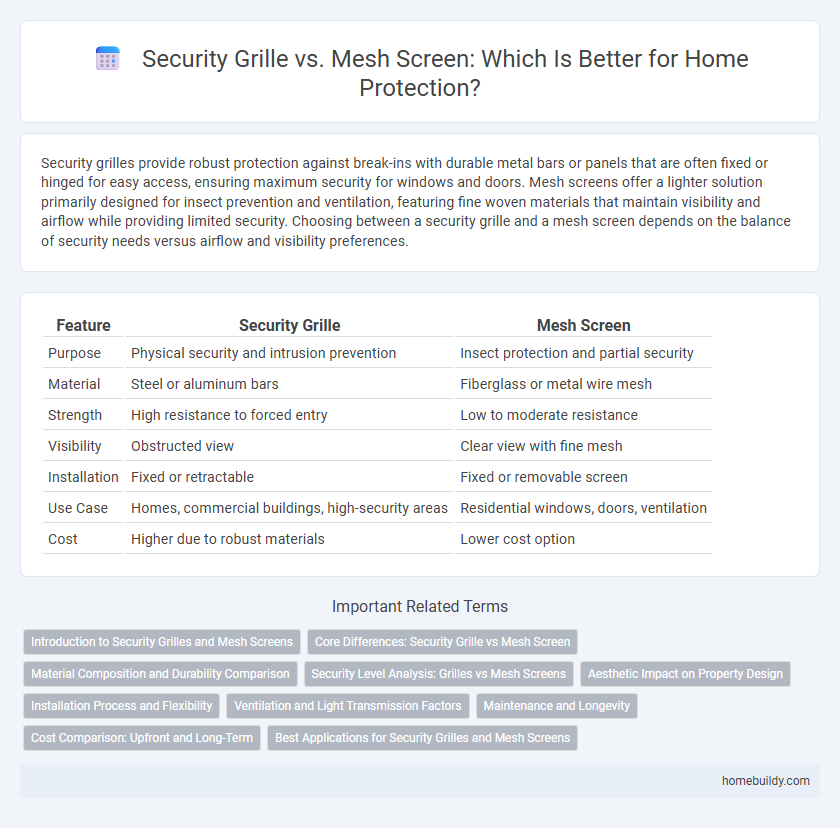Security grilles provide robust protection against break-ins with durable metal bars or panels that are often fixed or hinged for easy access, ensuring maximum security for windows and doors. Mesh screens offer a lighter solution primarily designed for insect prevention and ventilation, featuring fine woven materials that maintain visibility and airflow while providing limited security. Choosing between a security grille and a mesh screen depends on the balance of security needs versus airflow and visibility preferences.
Table of Comparison
| Feature | Security Grille | Mesh Screen |
|---|---|---|
| Purpose | Physical security and intrusion prevention | Insect protection and partial security |
| Material | Steel or aluminum bars | Fiberglass or metal wire mesh |
| Strength | High resistance to forced entry | Low to moderate resistance |
| Visibility | Obstructed view | Clear view with fine mesh |
| Installation | Fixed or retractable | Fixed or removable screen |
| Use Case | Homes, commercial buildings, high-security areas | Residential windows, doors, ventilation |
| Cost | Higher due to robust materials | Lower cost option |
Introduction to Security Grilles and Mesh Screens
Security grilles are robust metal barriers designed to enhance security by preventing unauthorized access while allowing visibility and airflow. Mesh screens consist of interwoven metal or synthetic strands that provide protection against insects and debris but offer less physical security compared to security grilles. Both serve distinct functions in residential and commercial settings, with security grilles prioritizing safety and mesh screens focusing on filtration and ventilation.
Core Differences: Security Grille vs Mesh Screen
Security grilles are constructed from rigid metal bars or rods, providing a robust physical barrier designed to prevent forced entry, while mesh screens consist of woven or welded fine wires primarily intended to keep out insects and debris. Security grilles offer higher impact resistance and enhanced security for windows and doors, whereas mesh screens prioritize ventilation and visibility with limited protective strength. The core difference lies in security grilles emphasizing physical protection and durability, whereas mesh screens focus on filtration and airflow.
Material Composition and Durability Comparison
Security grilles are typically made from heavy-duty steel or aluminum, providing superior strength and long-lasting resistance to impact and forced entry. Mesh screens generally utilize thinner materials like stainless steel or fiberglass, offering moderate protection but less durability under extreme conditions. The robust construction of security grilles ensures enhanced longevity and reliability compared to the more flexible but less resilient mesh screens.
Security Level Analysis: Grilles vs Mesh Screens
Security grilles provide a higher level of protection compared to mesh screens due to their robust construction with thicker bars and reinforced materials that resist forced entry and tampering. Mesh screens, typically made from finer wire mesh, offer basic deterrence but are more vulnerable to cutting or puncturing, making them less effective for high-security applications. The choice between security grilles and mesh screens should prioritize resistance to impact, penetration, and overall durability to enhance property protection.
Aesthetic Impact on Property Design
Security grilles offer a robust and visually distinct barrier that enhances modern architectural styles with their bold, structured design, whereas mesh screens provide a subtler, more minimalist appearance that preserves visibility and natural light flow. The choice between security grille and mesh screen significantly influences curb appeal, as grilles can serve as a decorative element with customizable patterns, while mesh screens maintain a sleek, unobtrusive presence. Integrating security grilles into property design often adds a sense of strength and durability, whereas mesh screens prioritize blending security with aesthetic transparency.
Installation Process and Flexibility
Security grilles typically feature a robust installation process involving fixed frames and secure mounting, making them ideal for permanent protection on windows and doors. Mesh screens offer greater flexibility due to their lightweight materials and customizable shapes, allowing easier adjustments and removal for seasonal or temporary use. While security grilles prioritize durability and fixed security, mesh screens excel in adaptability and ventilation options.
Ventilation and Light Transmission Factors
Security grilles provide superior ventilation compared to mesh screens due to their larger open areas, allowing more air to flow freely and improve indoor air quality. In terms of light transmission, security grilles generally offer higher visibility and natural light penetration since their design features wider gaps, whereas mesh screens tend to reduce light due to finer weaves. Selecting security grilles enhances airflow and lighting without compromising security, making them ideal for environments requiring both protection and comfort.
Maintenance and Longevity
Security grilles require minimal maintenance due to their robust construction and corrosion-resistant materials, ensuring long-term durability in harsh environments. Mesh screens, while providing good ventilation, often demand more frequent cleaning and repairs because of their finer mesh that can trap dirt and sustain damage. The longevity of security grilles surpasses mesh screens as they are designed to withstand physical impact and weathering without compromising structural integrity.
Cost Comparison: Upfront and Long-Term
Security grilles generally have a higher upfront cost compared to mesh screens due to their robust materials and installation complexity. Over the long term, security grilles offer superior durability and lower maintenance costs, making them more cost-effective for high-security needs. Mesh screens, while cheaper initially, may incur frequent replacement or repair expenses that increase their overall lifecycle cost.
Best Applications for Security Grilles and Mesh Screens
Security grilles excel in securing commercial storefronts and industrial facilities due to their robust metal bars that provide high resistance to forced entry and vandalism. Mesh screens are ideal for residential windows and ventilation areas where insect protection and airflow are priorities without compromising visibility. Choosing between security grilles and mesh screens depends on balancing the need for physical security with requirements for airflow, visibility, and aesthetic considerations.
Security grille vs Mesh screen Infographic

 homebuildy.com
homebuildy.com